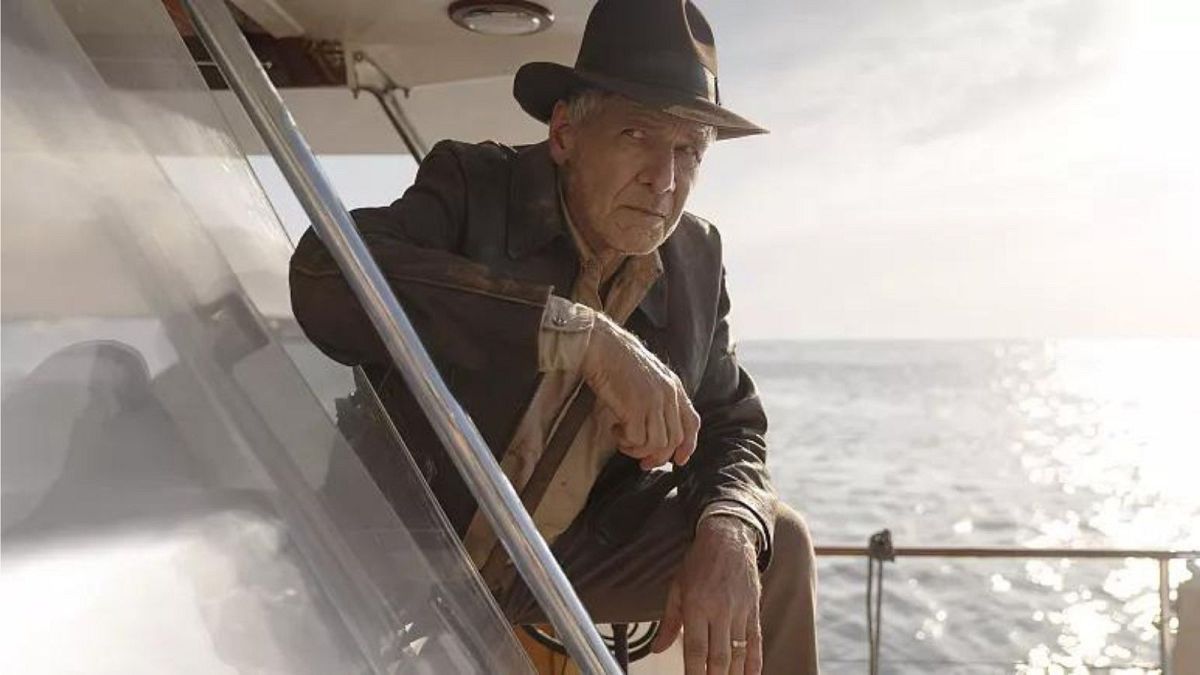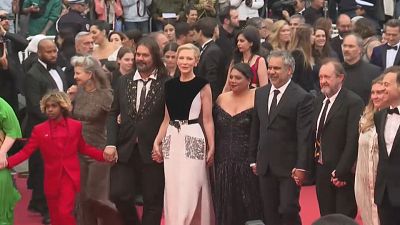The new and final Indiana Jones film starring Harrison Ford just got its premiere in Cannes. After ticketing woes, Euronews Culture managed to snag a seat. Was it worth it? Not really, it turns out...
Harrison Ford dons the fedora and the leather jacket for a fifth and final time in James Mangold’s Indiana Jones and The Dial of Destiny, the first Spielberg-less Indy. And it’s not the final hurrah we were hoping for...
It starts with an extremely promising prologue, which features one of the best action set pieces in the series. The 1944-set first act has a young(er) Indiana Jones (an impressively de-aged Ford) and his pal Basil Shaw (Toby Jones) in the middle of a Nazi looting session in a burning fort. We’re in the dying days of World War II and the beleaguered fascists are desperately looking to secure some occult trinkets for the Führer, including the Lance of Longinus - the blade that drew Christ’s blood. However, the film’s true MacGuffin soon comes to the fore, as Nazi Jürgen Voller (Mads Mikkelsen) understands that true power resides in Archimedes’ temporal contraption, the Antikythera, halved in two so that the whole may never fall into the wrong hands.
Cut to 1969, when an aging Indy is living in a small New York flat, complaining about his beatnik neighbours making too much noise with their hippy music, and making sure his morning coffees are Irish. The grumpy Dr. Jones, who is on the verge of retirement, has also been served divorce papers from Marion (Karen Allen), who was not able to cope with the grief of their son’s death.
The monotony of his current life is quickly broken with the appearance of his goddaughter Helena Shaw aka: Wombat (Phoebe Waller-Bridge). She’s on a mission of her own to continue to her pop Basil's search for the Dial. Indeed, much like John Hurt’s Harold Oxley in the previous adventure, Basil was driven insane by his research, believing that the Antikythera could predict “fissures in time”. The sizeable snag is that she’s not the only one looking for the steam-punk prize, as Voller – who has since helped the US win the space race – wants to get his “You didn’t win the war, Hitler lost it” mitts on the mythical object. Cue: Helena persuading Indy to join her on a globetrotting adventure to Morocco, Greece and Syracuse in order to “go out with a bang, back in the saddle – I’m not selling this, am I?”
You’re not wrong, Wombat.
Brass tacks: Indiana Jones and The Dial of Destiny starts off well, continues admirably during the predictable fetch quest, and utterly fowls it up by the last act. It’s not a complete disaster, but you genuinely wonder what the writers were mainlining when they came up with their barmy showdown, which completely wastes Mikkelsen’s efforts and feels like a cross between a Doctor Who episode retooled by the writers of The Magic School Bus. The thematic of time is taken way too literally, and while more charitable viewers may see a heroically stupid and audacious swerve to be applauded, it’s hard not to curse the squandered build-up and bemoan the fact the line “I’ve learned that it’s not what you believe in but how hard you believe in it” wasn’t handled with more care. The alien payoff 15 years ago in Kingdom of the Crystal Skull suddenly don’t feel so naff.
There’s still plenty to admire: the repetitive action remains very slick; the de-aging technology works wonders at the start and there’s none of that uncanny valley / ice-cream face that audiences have been subjected to in countless movies attempting to rejuvenate their stars’ complexions for a flashback sequence; and this instalment’s theme of the passing of time works. Mangold shines here, as he understands how to handle an aging rock star in his twilight years. He excelled at giving Wolverine a banger of a send off with Logan, and handles bittersweet nostalgia well, acknowledging that our 80-year-old hero’s skills have been impacted by the passage of time, loss and regret. There’s a real poignancy to that weathered mentality.
And to Ford’s impressively cut grandad bod, it has to be said.
The character is also given brief moments to dwell on death; when his colleagues or friends meet a grizzly end, none of it is taken for granted like it may have been before. “My friend just got murdered,” he snaps at Helena at one point, showing a man who’s dodged his fair share of bullets and now realises that his luck could soon run out.
It’s in these moments that you remember why the Indiana Jones franchise is so beloved, and why the character remains iconic: he is relatable, fallible, emotional, and never superhuman. But while Ford gives it socks and confirms once again that “it’s not the years, it’s the mileage”, his never-not-entertaining swansong is truly ruined by a four-way screenplay (Mangold, David Koepp, Jez and John-Henry Butterworth) that clearly couldn’t figure out how to say goodbye properly. At least, not ridiculously.
“Yesterday belongs to us,” says Voller during the incriminating final act. That much is true – we’ll always have yesterday’s Raiders of the Lost Arc, the unfairly maligned Temple of Doom and the franchise high of The Last Crusade. However, today is a crushing let-down that belongs to writers who should really know better than to cackhandedly mess with the laws of time.
Indiana Jones and The Dial of Destiny premiered at this year's Cannes Film Festival and is out in cinemas next month.



